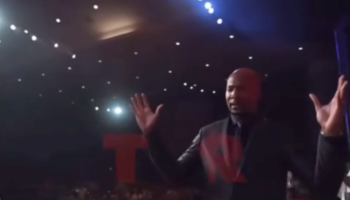With less than two weeks before the premiere of VH1’s Los Angeles edition of “Basketball Wives,” one woman who won’t be a cast member is Allison Mathis, notes the Hollywood Reporter’s legal blogger Eriq Gardner.
But Mathis, the mother of Miami Heat forward Chris Bosh’s child, can at least claim a small legal victory.
In May, Bosh sued Shed Media, the producers of the show, and Mathis for allegedly infringing his trademark and publicity rights. After the lawsuit was filed, Bosh and Shed reached a settlement. At some point, Mathis was let go from the show. But Bosh continued to pursue Mathis anyway, leading to a decision on Tuesday where the judge dismissed the case.
After Bosh sued Mathis in Los Angeles Superior Court, Mathis hit back with her own countersuit in Florida Circuit Court that alleged that the NBA superstar had ruined her chance to star on the television show.
Mathis claimed that she had previously lived with Bosh in Texas when Bosh suddenly and without explanation abandoned her when she was seven months pregnant. Mathis said she was in deteriorating medical condition and had to move in with her mother in Maryland before later relocating to Florida, where she caught a break by making a deal to appear on “Basketball Wives.”
Allegedly, Bosh’s interference pushed Shed to nix her from the program, leading to a situation where she’s now unemployed and broke. To remedy that, Mathis sued Bosh for about $250,000 — her estimate of the compensation she would have received for appearing on the program. Bosh has also continued his own claims against Mathis.
But California judge Dolly Gee sees no reason why Bosh’s lawsuit should continue in California since neither of the parties are based in California, nor have much contact there.
Among the reasons why the judge dismisses the lawsuit over Bosh’s objections for lack of personal jurisdiction is the following choice bit:
“Bosh requests an opportunity to conduct jurisdictional discovery in lieu of outright dismissal. His assertion that Mathis ‘is an aspiring actress . . .who has mastered a Californian accent’ is not a colorable showing that personal jurisdiction may exist over her. Rather, it amounts to ‘little more than a hunch that [discovery] might yield jurisdictionally relevant facts.’”













